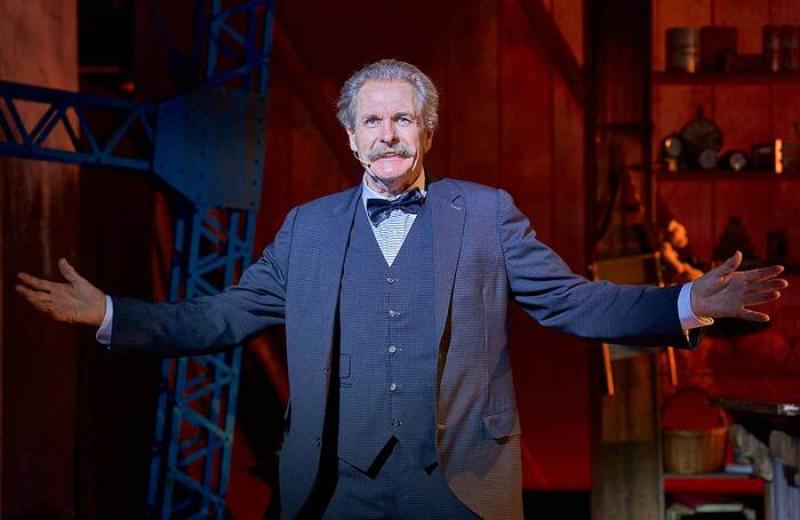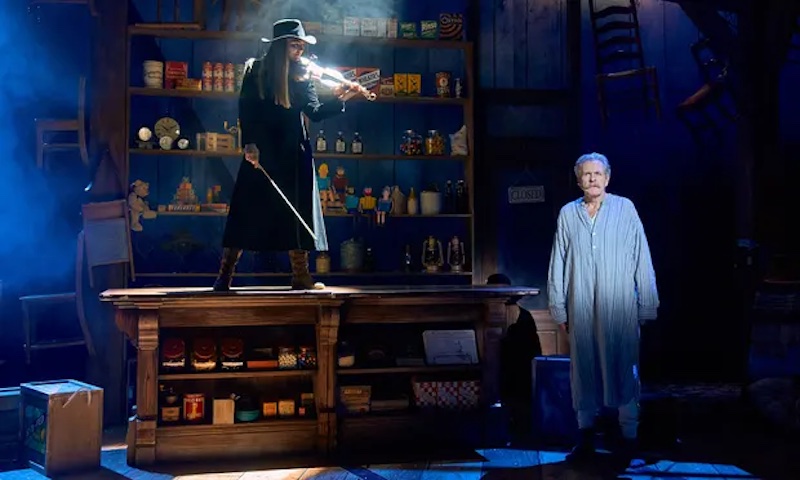Dolly Parton's Smoky Mountain Christmas Carol, Queen Elizabeth Hall review - Scrooge goes to Tennessee | reviews, news & interviews
Dolly Parton's Smoky Mountain Christmas Carol, Queen Elizabeth Hall review - Scrooge goes to Tennessee
Dolly Parton's Smoky Mountain Christmas Carol, Queen Elizabeth Hall review - Scrooge goes to Tennessee
Dolly and Dickens team up for dreams and deliverance

We’ve had 75 years to get used to Scrooge McDuck, so we can hardly complain if the Americans indulge in a little cultural appropriation and send Charles Dickens’ misanthrope to Depression-era Tennessee for another whirl on the catharsis-redemption ride.
Expanded from a 40-minute "park presentation" at Dollywood into a full-fledged musical with a book by David H. Bell first seen in 2019 in Boston, the show is most memorable for its songs. I once tried to convert a Dolly-sceptic (not many of those about these days) by suggesting that she wrote "working class arias" - listen to “Coat Of Many Colours” and tell me I’m wrong. While there’s no song of that calibre for the fine cast here to sing, there are plenty that find the sweet spot between pop and country that, along with lyrics that describe trademark economic vulnerability leavened with feisty female agency, have defined her career for more than 50 years.
 We open with great slabs of exposition locating us in the hungry thirties in a rural town in which every business is owned by Ebenezer Scrooge. Soon enough he’s humbugging Christmas away, resenting Cratchit’s day off and sending the charity collectors back into the snow with a flea in their ear.
We open with great slabs of exposition locating us in the hungry thirties in a rural town in which every business is owned by Ebenezer Scrooge. Soon enough he’s humbugging Christmas away, resenting Cratchit’s day off and sending the charity collectors back into the snow with a flea in their ear.
Then comes Marley, the real villain of the piece, and the three ghosts, who show Scrooge the errors of his ways and the consequences that will ensue should he continue his cruel exploitation (aka capitalism). So robust are Dickens’ characters and so universal his themes that such a stretch is achieved easily. I’ll confess to rather enjoying the young Scrooge being addressed as Eben (pronounced "Eeben") before his rejection by Sadie and subsequent descent into a miser’s misery.
Robert Bathurst’s Scrooge (pictured above with Corey Wickens), his Teddy Roosevelt moustache deserving of a credit in its own right, doesn’t have a great deal to do (there’s but a half-hearted “You boy. What day is this?”) but that turns our attention to the super ensemble and band who give full value to the score. George Maguire doubles as Cratchit and a genuinely evil Marley, singing with his Olivier award-winning skill and confidence. Sarah O’Connor and Danny Whitehead deliver the best ballad, “Three Candles”, as the siblings Fanny and Eben with plenty of charm and there’s a splendid Grand Ole Opry style entr’acte to enjoy in which fiddle, banjo and spoons are prominent.
The best tunes are reserved for the company as a whole filling Scott Davis’s functional, if somewhat uninspiring set, with a love song for the their home, “Appalachian Snowfall” and a paean to the power of Christian virtue, “Circle Of Love”. Don’t worry too much at that, the er… true spirit of Christmas is represented by “Wish Book” in which the townsfolk ogle the Sears and Roebuck catalogue for the consumer goodies still a couple of decades away from them.
What’s missing is the gothic horror that makes kids squeal and adults squirm. Marley’s chains wouldn’t weigh down Tiny Tim, the graveyard scene is more a celebration than terrifying vision and Ignorance and Want are represented by a single cherubic waif (indeed, everyone is healthy and well-dressed and displaying expensive orthodonture, but such is the stage in 2022). That said, my eyebrows were raised by an explicit link made between the message of Jesus Christ and a workers’ violent insurrection put down by Marley’s goons, a snippet of liberation theology in action that I did not expect to see.
Of course, the show will please Dolly’s fans, old and young, and it won’t offend the purists too much either (and they’ve plenty of Christmas Carols to choose from this December if they want to preserve the sanctity of “God bless us, everyone”). But the result is all just a little too comforting to honour its source material fully. For real Dickensian discomfort, the wellspring of the radicalism that blazed in his writing, all you need to do is look around you on the walk back to the tube station.
rating
Explore topics
Share this article
The future of Arts Journalism
You can stop theartsdesk.com closing!
We urgently need financing to survive. Our fundraising drive has thus far raised £49,000 but we need to reach £100,000 or we will be forced to close. Please contribute here: https://gofund.me/c3f6033d
And if you can forward this information to anyone who might assist, we’d be grateful.

Subscribe to theartsdesk.com
Thank you for continuing to read our work on theartsdesk.com. For unlimited access to every article in its entirety, including our archive of more than 15,000 pieces, we're asking for £5 per month or £40 per year. We feel it's a very good deal, and hope you do too.
To take a subscription now simply click here.
And if you're looking for that extra gift for a friend or family member, why not treat them to a theartsdesk.com gift subscription?
more Theatre
 Dracula, Lyric Hammersmith review - hit-and-miss recasting of the familiar story as feminist diatribe
Morgan Lloyd Malcolm's version puts Mina Harkness centre-stage
Dracula, Lyric Hammersmith review - hit-and-miss recasting of the familiar story as feminist diatribe
Morgan Lloyd Malcolm's version puts Mina Harkness centre-stage
 Reunion, Kiln Theatre review - a stormy night in every sense
Beautifully acted, but desperately grim drama
Reunion, Kiln Theatre review - a stormy night in every sense
Beautifully acted, but desperately grim drama
 The Code, Southwark Playhouse Elephant review - superbly cast, resonant play about the price of fame in Hollywood
Tracie Bennett is outstanding as a ribald, riotous Tallulah Bankhead
The Code, Southwark Playhouse Elephant review - superbly cast, resonant play about the price of fame in Hollywood
Tracie Bennett is outstanding as a ribald, riotous Tallulah Bankhead
 The Lady from the Sea, Bridge Theatre review - flashes of brilliance
Simon Stone refashions Ibsen in his own high-octane image
The Lady from the Sea, Bridge Theatre review - flashes of brilliance
Simon Stone refashions Ibsen in his own high-octane image
 Romans: A Novel, Almeida Theatre review - a uniquely extraordinary work
Alice Birch’s wildly epic family drama is both mind-blowing and exasperating
Romans: A Novel, Almeida Theatre review - a uniquely extraordinary work
Alice Birch’s wildly epic family drama is both mind-blowing and exasperating
 The Producers, Garrick Theatre review - Ve haf vays of making you laugh
You probably know what's coming, but it's such great fun!
The Producers, Garrick Theatre review - Ve haf vays of making you laugh
You probably know what's coming, but it's such great fun!
 Not Your Superwoman, Bush Theatre review - powerful tribute to the plight and perseverance of Black women
Golda Rosheuvel and Letitia Wright excel in a super new play
Not Your Superwoman, Bush Theatre review - powerful tribute to the plight and perseverance of Black women
Golda Rosheuvel and Letitia Wright excel in a super new play
 Cow | Deer, Royal Court review - paradox-rich account of non-human life
Experimental work about nature led by Katie Mitchell is both extraordinary and banal
Cow | Deer, Royal Court review - paradox-rich account of non-human life
Experimental work about nature led by Katie Mitchell is both extraordinary and banal
 Deaf Republic, Royal Court review - beautiful images, shame about the words
Staging of Ukrainian-American Ilya Kaminsky’s anti-war poems is too meta-theatrical
Deaf Republic, Royal Court review - beautiful images, shame about the words
Staging of Ukrainian-American Ilya Kaminsky’s anti-war poems is too meta-theatrical
 Laura Benanti: Nobody Cares, Underbelly Boulevard Soho review - Tony winner makes charming, cheeky London debut
Broadway's acclaimed Cinderella, Louise, and Amalia reaches Soho for a welcome one-night stand
Laura Benanti: Nobody Cares, Underbelly Boulevard Soho review - Tony winner makes charming, cheeky London debut
Broadway's acclaimed Cinderella, Louise, and Amalia reaches Soho for a welcome one-night stand
 The Pitchfork Disney, King's Head Theatre review - blazing with dark energy
Thrilling revival of Philip Ridley’s cult classic confirms its legendary status
The Pitchfork Disney, King's Head Theatre review - blazing with dark energy
Thrilling revival of Philip Ridley’s cult classic confirms its legendary status
 Born with Teeth, Wyndham's Theatre review - electric sparring match between Shakespeare and Marlowe
Rival Elizabethan playwrights in an up-to-the-minute encounter
Born with Teeth, Wyndham's Theatre review - electric sparring match between Shakespeare and Marlowe
Rival Elizabethan playwrights in an up-to-the-minute encounter

Add comment